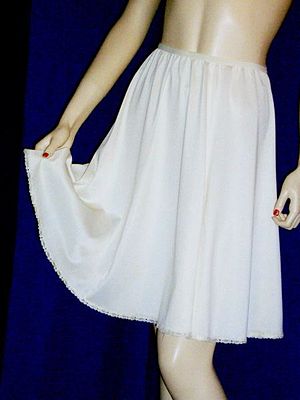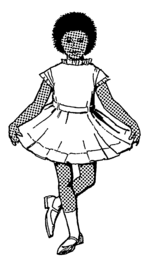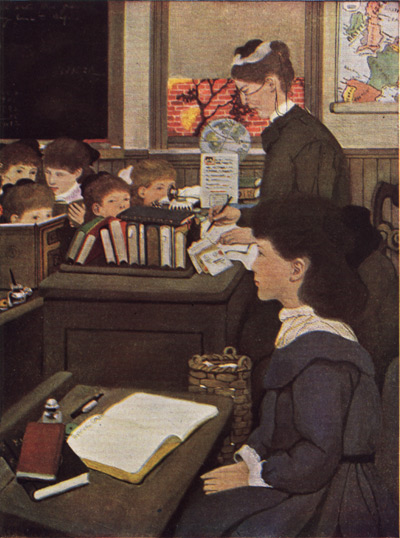『小公女2-1』英文/和訳【2-1.フランス語の授業】
※カラフル対訳で紹介している作品はすべてパブリックドメインです。
このサイトで使われている作品のすべては著作権の切れた名作などの全文を電子化して、インターネット上で公開しているProject Gutenberg(プロジェクト・グーテンベルク)、LibriVox(リブリヴォックス、朗読図書館)の作品を出典としています。
翻訳者:中務秀典
When Sara entered the schoolroom the next morning everybody looked at her with wide, interested eyes.[目を大きく開いて興味深げに]
翌朝、セーラが教室に入ると、みんなが興味津々の目で彼女を見た。
By that time every pupil—from Lavinia Herbert, who was nearly thirteen and felt quite grown up,
その頃までには、すべての生徒が—もうすぐ13歳になり、自分ではすっかり大人だと思っているラヴィニア・ハーバートから、
to Lottie Legh, who was only just four and the baby of the school—had heard a great deal[かなり多い] about her.
4歳になったばかりで学校の赤ん坊だったロッティー・レグまで、彼女のことをたくさん聞いていた。
They knew very certainly[確実に, 明確に] that she was Miss Minchin’s show pupil[宣伝のための生徒] and was considered a credit to the establishment.[(公共または私設の)設立物]
彼女たちは、セーラがミンチン先生の看板生徒であり、学院の名誉と見做(みな)されていることを非常によく知っていた。
One or two of them had even caught a glimpse of her French maid, Mariette, who had arrived the evening before.
そのうちの一人か二人は、前の晩に来たフランス人のメイドのマリエットをちらりと見ていた。
Lavinia had managed to pass[通過する] Sara’s room when the door was open, and had seen Mariette opening a box which had arrived late from some shop.
ラヴィニアはドアが開いているセーラの部屋の前を何とかしてうまく通り、どこかの店から遅れて届いた箱を開けているマリエットの姿を見た。
“It was full of petticoats with lace frills on them—frills and frills,” she whispered to her friend Jessie as she bent over her geography.
「レースのフリルのついたペティコート でいっぱいだったわ——フリル、フリル…」地理(の教科書)の上に身を屈めながら、ラヴィニアは友人のジェシーにささやいた。
でいっぱいだったわ——フリル、フリル…」地理(の教科書)の上に身を屈めながら、ラヴィニアは友人のジェシーにささやいた。
“I saw her shaking them out.
「私、そのメイドがそれらを振って広げているのを見たの。
I heard Miss Minchin say to Miss Amelia that her clothes were so grand[豪奢な] that they were ridiculous for a child.
ミンチン先生がミス・アメリアに、セーラの服はぜいたくすぎて子どもに与えるなんてばかげていると言うのが聞こえたの。
My mamma says that children should be dressed simply. She has got one of those petticoats on now. I saw it when she sat down.”
私のママは子供は質素な服を着るべきだと言っているわ。あの子は今、ペティコートを着ている[身に着けている]んでしょうね。あの子が座った時に見たもの」
“She has silk stockings on!” whispered Jessie, bending over her geography also. “And what little feet! I never saw such little feet.”
「絹のストッキングを履いているわ!」ジェシーも地理(の教科書)に身を屈めながら囁いた。「何て小さな足なの! あんな小さな足は見たことがないわ」
“Oh,” sniffed Lavinia, spitefully, “that is the way her slippers are made.
「ふん!」とラヴィニアは意地悪そうに鼻を鳴らした。「あの子の上靴がそういうように作られているからよ。
My mamma says that even big feet can be made to look small if you have a clever[上手な, 賢い] shoemaker.
私のママが言うには、腕のいい靴職人なら、足が大きくても小さく見せることができるそうよ。
I don’t think she is pretty at all. Her eyes are such a queer color.”
私、彼女は全然かわいくないと思うわ。あの子の目はとても変な色をしているんだもの」
“She isn’t pretty as other pretty people are,” said Jessie, stealing a glance across the room; “but she makes you want to look at her again.
「彼女は、一般的な『かわいい』というのとは違うわね」ジェシーは、部屋の向こう側をちらっと目をやって言った。 「でも、なんだかまた見てみたくなるのよ。[また見たくさせる]
She has tremendously[途方もなく] long eyelashes, but her eyes are almost green.”
彼女のまつげはすごく長くて、目の色は緑に近いわ。
Sara was sitting quietly in her seat, waiting to be told[…をするよう命じられる] what to do.
セーラは静かに席に座って、何をすればいいのか言われるのを待っていた。
She had been placed[~に置かれた] near Miss Minchin’s desk. She was not abashed[決まり悪くさせる] at all by the many pairs of eyes watching her.
セーラはミス・ミンチンの机の近くに座った。沢山の目がセーラを見つめたが、まったく恥ずかしがったりしなかった。
She was interested and looked back quietly at the children who looked at her.
興味を持ったセーラは、自分を見つめる子供たちを静かに見つめ返した。
She wondered what they were thinking of, and if they liked Miss Minchin, and if they cared for[好む] their lessons, and if any of them had a papa at all like her own.
セーラは彼女たちは何を考えているのか、ミス・ミンチンのことが好きなのか、授業は好きなのか、そして自分と(まったく)同じようなパパがいる子がいるのかと考えた。
She had had a long talk with Emily about her papa that morning.
セーラはその日の朝、パパについてのことをエミリーと長話しをしたところだった。
“He is on the sea now, Emily,” she had said.
「パパは今、海の上ね。エミリー」とセーラは言っていた。
“We must be very great friends to each other and tell each other things. Emily, look at me.
「私たちはとても仲が良しになって、お互いに色々なことをおしゃべりしましょうね[しなければならない]。エミリー、私を見て。
You have the nicest eyes I ever saw—but I wish you could speak.”
あなたの目は最高にきれいだわ。あなたが言葉が話せたらいいのに」
She was a child full of imaginings and whimsical[気まぐれな, 変な] thoughts,
セーラは想像力と奇抜な考えに満ちた子どもで、
and one of her fancies was that there would be a great deal of comfort in even pretending that Emily was alive and really heard and understood.
(数ある)彼女の空想の一つが、エミリーが生きていて、本当に(自分の話すことを)聞いて理解しているというふりをしているだけでも、大きな慰めになるというものだった。
After Mariette had dressed her in her dark-blue[濃青色] schoolroom frock[子供用のワンピースのドレス] and tied her hair with a dark-blue ribbon,
マリエットに紺色の学校のフロックを着せてもらい、髪を紺色のリボンで結んでもらうと、
she went to Emily, who sat in a chair of her own, and gave her a book.
自分の椅子に座っているエミリーのところへ行き、本を一冊渡した。
“You can read that while I am downstairs,” she said;
「私が階下にいる間、それを読んでてもいいわよ」と言って、
and, seeing Mariette looking at her curiously, she spoke to her with a serious little face.
マリエットが不思議そうに自分を見ているのを見ると、セーラの小さな顔は真剣な表情で話した。
“What I believe about dolls,” she said, “is that they can do things they will not let us know about.
「人形について私が信じているのは、人形はいろいろなことができるんだけど、私たちに知られないようにしている、ということなの」と彼女は言った。
Perhaps, really, Emily can read and talk and walk, but she will only do it when people are out of the room.
たぶん、本当は、エミリーは本を読んだり、話したり、歩いたりすることができるんだけど、人間が部屋から出て行っていなくなった時にしかしないの。
That is her secret. You see, if people knew that dolls could do things, they would make them work.
それがエミリーの秘密なの。だって、人形にそんなことができると人間が知ったら、人形たちを働かせようとするでしょ。
So, perhaps, they have promised each other to keep it a secret.
だから、もしかしたら、お互いに秘密にしておく約束をしているのかもしれないわ。
If you stay in the room, Emily will just sit there and stare;
あなたが部屋にいれば、エミリーはただ座ってじっと見ているだけなんだけど、
but if you go out, she will begin to read, perhaps, or go and look out of the window.
あなたが外に出ていったら、本を読み始めたり、たぶん、窓の外を見に行ったりするのよ。
Then if she heard either of us coming, she would just run back and jump into her chair and pretend she had been there all the time.”[その間中ずっと]
でも、もし私たちのどちらかが来る(足音)を聞いたら、エミリーはすぐに走って戻って椅子に飛び乗って、ずっとそこにいたようなふりをするの」
“Comme elle est drole!” Mariette said to herself,[自分自身に言う] and when she went downstairs she told the head housemaid about it.
「なんて面白い子!」とマリエットはつぶやき、階下に降りるとそのことをメイド長に話した。
But she had already begun to like this odd little girl who had such an intelligent small face and such perfect manners.
しかし、マリエットはすでに聡明そうな小顔で完璧なマナーを身に着けた、この風変わりな少女のことを、好きになり始めていた。
She had taken care of children before who were not so polite.
マリエットは以前、あまり礼儀正しくない子供の世話をしていた。
Sara was a very fine little person, and had a gentle, appreciative[感謝の] way of saying, “If you please, Mariette,” “Thank you, Mariette,” which was very charming.
セーラは小さくてもとても立派な子で、優しく感謝の気持ちがこもっている話し方で、「もしよろしければ、マリエット」「ありがとう、マリエット」というように、とても感じがよかった。
Mariette told the head housemaid that she thanked her as if she was thanking a lady.
マリエットはメイド長に、あの子は私にまるで貴婦人にお礼をするように、お礼を言ってくれると話した。
“Elle a l’air d’une princesse, cette petite,” she said.
「まるで小公女のようだわ」と、マリエットは言った。
Indeed, she was very much pleased[喜んで, 満足して] with her new little mistress and liked her place greatly.
実際、マリエットは新しい小さな女主人と仕事場にとても満足していた。
After Sara had sat in her seat in the schoolroom for a few minutes, being looked at by the pupils,
セーラが教室の席に座り、数分間ほど生徒たちにじろじろと見られた後、
Miss Minchin rapped in a dignified[威厳のある] manner upon her desk.
ミス・ミンチンが威厳を持って机の上をコツコツと叩いた。
“Young ladies,” she said, “I wish to introduce you to your new companion.”
「お嬢さんたち」 ミス・ミンチンは言った。「新しいお友達を紹介しましょう」
All the little girls rose in their places, and Sara rose also.
小さな女の子たちは皆、それぞれの場所で立ち上がったので、セーラもまた立ち上がった。
“I shall expect[~を期待する] you all to be[~となる, ~する] very agreeable[感じよく] to Miss Crewe; she has just come to us from a great distance—in fact, from India.
みなさん、クルーさんと仲良くするようにね。 彼女は遠く、実のところ、インドから来たばかりです。
As soon as lessons are over you must make each other’s acquaintance.”[知り合いになる]
授業が終わったらすぐにお互いにお友達になるように」
The pupils bowed ceremoniously, and Sara made a little curtsy, and then they sat down and looked at each other again.
生徒たちは厳かにお辞儀をし、セーラは軽くカーテシー[片足を引いて軽く膝を曲げる、女性が位の高い者に対して行うヨーロッパの伝統的な挨拶] をした。それからみんな座り、またお互いを見つめ合った。
をした。それからみんな座り、またお互いを見つめ合った。
“Sara,” said Miss Minchin in her schoolroom manner,[物腰] “come here to me.”
「セーラさん」と ミス・ミンチンは学校の教室用の言い方で言った。 「こちらに来なさい」
She had taken a book from the desk and was turning over its leaves. Sara went to her politely.
ミス・ミンチンは机から本を1冊取り、ページをめくった。セーラは礼儀正しく彼女のところへ行った。
“As your papa has engaged a French maid for you,” she began,
「あなたのお父様があなたにフランス人のメイドを雇ったということは」と、ミス・ミンチンは言い始めた。
“I conclude[断定する] that he wishes you to make a special study of[専門に研究する] the French language.”
「それはきっとフランス語を特別に(一生懸命に)勉強することを望んでるということですわね」
Sara felt a little awkward.[ぎこちない]
セーラは少し気まずく感じた。
“I think he engaged her,” she said, “because he—he thought I would like her, Miss Minchin.”
「パパが彼女を雇ったのは」「パパは、私が彼女のことを好きになると思ったからだと思います。ミンチン先生」とセーラは答えた。
“I am afraid,” said Miss Minchin, with a slightly sour[ひねくれた] smile,
「たぶん…」と、ミス・ミンチンは少し意地の悪い笑みを浮かべて言った。
“that you have been a very spoiled little girl and always imagine that things are done because you like them.
「あなたはとても甘やかされて育った少女だから、いつも自分が好きだから物事が行われていると考えているようですね。
My impression is that your papa wished[~を望む] you to learn French.”
私の印象では、お父様はフランス語を学ばせたがっていたように思えました」

